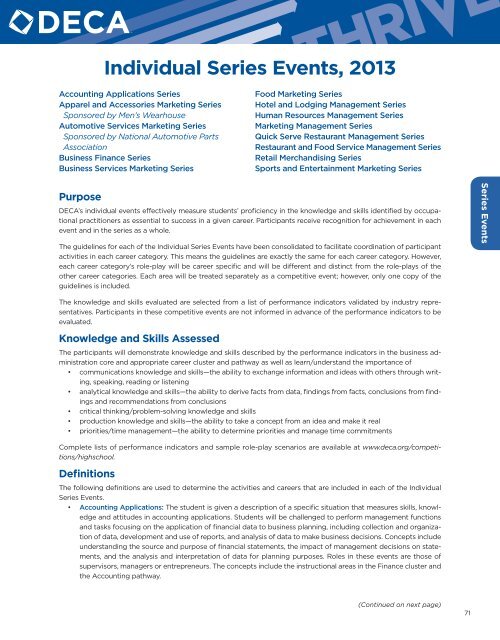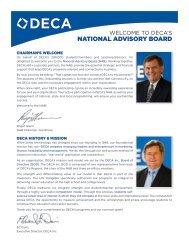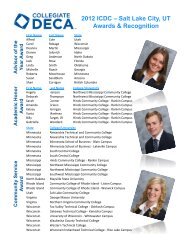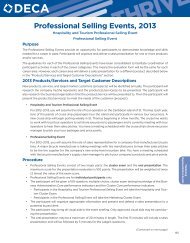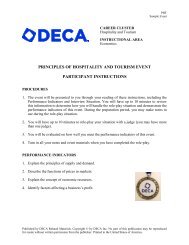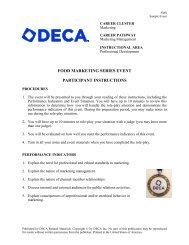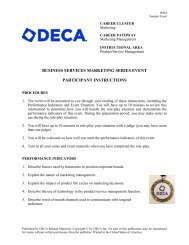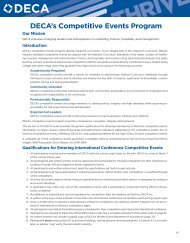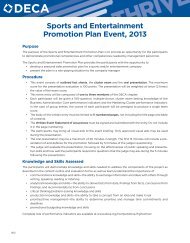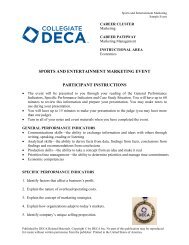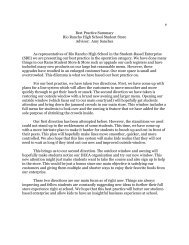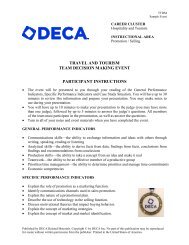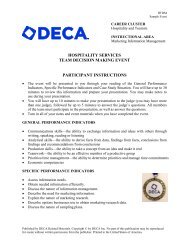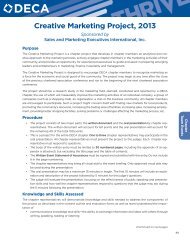Individual Series Events, 2013 - DECA
Individual Series Events, 2013 - DECA
Individual Series Events, 2013 - DECA
Create successful ePaper yourself
Turn your PDF publications into a flip-book with our unique Google optimized e-Paper software.
Accounting Applications <strong>Series</strong><br />
Apparel and Accessories Marketing <strong>Series</strong><br />
Sponsored by Men’s Wearhouse<br />
Automotive Services Marketing <strong>Series</strong><br />
Sponsored by National Automotive Parts<br />
Association<br />
Business Finance <strong>Series</strong><br />
Business Services Marketing <strong>Series</strong><br />
Purpose<br />
<strong>Individual</strong> <strong>Series</strong> <strong>Events</strong>, <strong>2013</strong><br />
Food Marketing <strong>Series</strong><br />
Hotel and Lodging Management <strong>Series</strong><br />
Human Resources Management <strong>Series</strong><br />
Marketing Management <strong>Series</strong><br />
Quick Serve Restaurant Management <strong>Series</strong><br />
Restaurant and Food Service Management <strong>Series</strong><br />
Retail Merchandising <strong>Series</strong><br />
Sports and Entertainment Marketing <strong>Series</strong><br />
<strong>DECA</strong>’s individual events effectively measure students’ proficiency in the knowledge and skills identified by occupational<br />
practitioners as essential to success in a given career. Participants receive recognition for achievement in each<br />
event and in the series as a whole.<br />
The guidelines for each of the <strong>Individual</strong> <strong>Series</strong> <strong>Events</strong> have been consolidated to facilitate coordination of participant<br />
activities in each career category. This means the guidelines are exactly the same for each career category. However,<br />
each career category’s role-play will be career specific and will be different and distinct from the role-plays of the<br />
other career categories. Each area will be treated separately as a competitive event; however, only one copy of the<br />
guidelines is included.<br />
The knowledge and skills evaluated are selected from a list of performance indicators validated by industry representatives.<br />
Participants in these competitive events are not informed in advance of the performance indicators to be<br />
evaluated.<br />
Knowledge and Skills Assessed<br />
The participants will demonstrate knowledge and skills described by the performance indicators in the business administration<br />
core and appropriate career cluster and pathway as well as learn/understand the importance of<br />
• communications knowledge and skills—the ability to exchange information and ideas with others through writing,<br />
speaking, reading or listening<br />
• analytical knowledge and skills—the ability to derive facts from data, findings from facts, conclusions from findings<br />
and recommendations from conclusions<br />
• critical thinking/problem-solving knowledge and skills<br />
• production knowledge and skills—the ability to take a concept from an idea and make it real<br />
• priorities/time management—the ability to determine priorities and manage time commitments<br />
Complete lists of performance indicators and sample role-play scenarios are available at www.deca.org/competitions/highschool.<br />
Definitions<br />
The following definitions are used to determine the activities and careers that are included in each of the <strong>Individual</strong><br />
<strong>Series</strong> <strong>Events</strong>.<br />
• Accounting Applications: The student is given a description of a specific situation that measures skills, knowledge<br />
and attitudes in accounting applications. Students will be challenged to perform management functions<br />
and tasks focusing on the application of financial data to business planning, including collection and organization<br />
of data, development and use of reports, and analysis of data to make business decisions. Concepts include<br />
understanding the source and purpose of financial statements, the impact of management decisions on statements,<br />
and the analysis and interpretation of data for planning purposes. Roles in these events are those of<br />
supervisors, managers or entrepreneurs. The concepts include the instructional areas in the Finance cluster and<br />
the Accounting pathway.<br />
(Continued on next page)<br />
71<br />
<strong>Series</strong> <strong>Events</strong>
ACT, AAM, ASM, BFS, BSM, FMS, HLM, HRM, MMS, QSRM, RFSM, RMS, SEM–<strong>2013</strong><br />
72<br />
• Apparel and Accessories Marketing: The student is given a description of a specific situation that measures<br />
skills, knowledge and attitudes in apparel and accessories marketing or marketing management. Students will<br />
be challenged to perform marketing and management functions and tasks in retail establishments, wholesale<br />
establishments and/or manufacturing firms primarily engaged in the marketing of clothing and related articles<br />
for personal wear and adornment. Roles in these events are those of customers, employees, supervisors and<br />
managers. The concepts include the instructional areas in the Marketing cluster and the Merchandising pathway.<br />
• Automotive Services Marketing: The student is given a description of a specific situation that measures skills,<br />
knowledge and attitudes in automotive services marketing. Students will be challenged to perform marketing<br />
and management functions and tasks related to auto dealers, service stations and related businesses or auto<br />
parts stores. Roles in these events are those of customers, employees, supervisors, managers and entrepreneurs.<br />
The concepts include the instructional areas in the Marketing cluster and the Marketing Management<br />
pathway.<br />
• Business Finance: The student is given a description of a specific situation that measures skills, knowledge and<br />
attitudes in business finance. Students will be challenged to perform management functions and tasks focusing<br />
on high-level financial and business planning, including collection and organization of data, development and<br />
use of reports, and analysis of data to make business decisions. Concepts include understanding the source and<br />
purpose of financial statements, the impact of management decisions on statements, and the analysis and interpretation<br />
of data for corporate planning purposes. Roles in these events are those of supervisors, managers,<br />
financial experts or entrepreneurs. The concepts include the instructional areas in the Finance cluster and the<br />
Corporate Finance pathway.<br />
• Business Services Marketing: The student is given a description of a specific situation that measures skills,<br />
knowledge and attitudes in business services marketing. Students will be challenged to perform marketing<br />
functions and tasks involved in providing services to businesses on a fee or contract basis or providing<br />
services to consumers. Roles in these events are those of customers, employees, supervisors, managers and<br />
entrepreneurs. The concepts include the instructional areas in the Marketing cluster and the Marketing Management<br />
pathway.<br />
• Food Marketing: The student is given a description of a specific situation that measures skills, knowledge and<br />
attitudes in food marketing or marketing management. Students will be challenged to perform marketing and<br />
management functions and tasks in retail establishments, wholesale establishments and manufacturing firms<br />
resulting in the sale of food. Roles in these events are those of customers, employees, supervisors and managers.<br />
The concepts include the instructional areas in the Marketing cluster and the Marketing Management pathway.<br />
• Hotel and Lodging Management: The student is given a description of a specific situation that measures skills,<br />
knowledge and attitudes in hotel and lodging marketing or marketing management. Students will be challenged<br />
to perform marketing and management functions and tasks in hotels, motels, lodging services, convention<br />
services, and food and beverage services. Roles in these events are those of customers, employees, supervisors<br />
and managers. The concepts include the instructional areas in the Hospitality and Tourism cluster and the<br />
Lodging pathway.<br />
• Human Resources Management: The student is given a description of a specific situation that measures skills,<br />
knowledge and attitudes in human resources management. Students will be challenged to perform management<br />
functions and tasks focusing on staffing, recruitment, selection, training, performance appraisal, compensation<br />
and safety training. Roles in these events are those of supervisors, managers, human resource experts or<br />
entrepreneurs. The concepts include the instructional areas of the Business Management and Administration<br />
cluster and Human Resources Management pathway.<br />
• Marketing Management: The student is given a description of a specific situation that measures skills, knowledge<br />
and attitudes in marketing management. Students will be challenged to perform marketing and management<br />
functions and tasks that can be applied broadly in a non-retail marketing environment. Roles in<br />
these events are those of clients, employees, supervisors, managers and entrepreneurs. The concepts include<br />
the instructional areas in the Marketing cluster and the Marketing Management pathway.<br />
• Quick Serve Restaurant Management: The student is given a description of a specific situation that measures<br />
skills, knowledge and attitudes in quick-service restaurant management. Students will be challenged to perform<br />
marketing and management functions and tasks in retail establishments, wholesale establishments and<br />
manufacturing firms primarily engaged in the quick-serve restaurant industry. Roles in these events are those of<br />
customers, employees, supervisors, managers and entrepreneurs. The concepts include the instructional areas<br />
in the Hospitality and Tourism cluster and the Restaurants and Food and Beverage Services pathway.
ACT, AAM, ASM, BFS, BSM, FMS, HLM, HRM, MMS, QSRM, RFSM, RMS, SEM–<strong>2013</strong><br />
• Restaurant and Food Service Management: The student is given a description of a specific situation that measures<br />
skills, knowledge and attitudes in restaurant and food service management. Students will be challenged<br />
to perform marketing and management functions and tasks in a full-service restaurant or a food-service business.<br />
Roles in these events are those of supervisors, managers and entrepreneurs. The concepts include the<br />
instructional areas in the Hospitality and Tourism cluster and the Restaurants and Food and Beverage Services<br />
Pathway.<br />
• Retail Merchandising: The student is given a description of a specific situation that measures skills, knowledge<br />
and attitudes in retail merchandising management. Students will be challenged to perform marketing and management<br />
functions and tasks that can be applied in any retail establishment. Roles in these events are those of<br />
customers, employees, supervisors and managers. The concepts include the instructional areas in the Marketing<br />
cluster and the Merchandising pathway.<br />
• Sports and Entertainment Marketing: The student is given a description of a specific situation that measures<br />
skills, knowledge and attitudes in sports and entertainment marketing. Students will be challenged to perform<br />
marketing and management functions and tasks related to amateur or professional sports or sporting<br />
events, entertainment or entertainment events, selling or renting of supplies and equipment (other than<br />
vehicles) used for recreational or sporting purposes, products and services related to hobbies or cultural<br />
events, or businesses primarily engaged in satisfying the desire to make productive or enjoyable use of leisure<br />
time. Roles in these events are those of supervisors and managers. The concepts include the instructional<br />
areas in the Marketing cluster and the Marketing Management pathway.<br />
Procedure<br />
• An individual series event consists of two major parts: a written cluster exam and two preliminary role-playing<br />
events. A third role-play activity will be given to finalists.<br />
• The participant will be given a 100-question, multiple-choice, cluster exam.<br />
• The participant will be given a written scenario to review. It may indicate a product or service to sell; a merchandising<br />
decision; a situation involving communications, human relations, economics or professional development;<br />
or a business management consideration. The event description will inform the participant of the role he/she will<br />
play and the role the judge will play.<br />
• In the role-playing portion of the event, participants must accomplish a task by translating what they have<br />
learned into effective, efficient and spontaneous action.<br />
• A list of five performance indicators specific to the scenario is included in the participant’s instructions. These<br />
are distinct tasks the participant must accomplish during the role-play. The judge will evaluate the participant’s<br />
role-play performance on these tasks and on several follow-up questions.<br />
• Participants will have 10 minutes to review the situation and to develop a professional approach to solving the<br />
problem. Participants may use notes made during the preparation time during the presentation.<br />
• Up to 10 minutes are then allowed for the participant to interact with a competent judge and demonstrate how<br />
he/she would solve the situation or problem. The judge is a qualified business executive playing the role of a second<br />
party in the situation. Following the role-play, the judge evaluates the participant’s responses and records<br />
the results on an evaluation form developed especially for each role-play event.<br />
• Participants may not bring printed reference materials, visual aids, etc., to the competitive event.<br />
• Materials appropriate for the situation may be handed to or left with the judge. Materials handed to the judge<br />
must be created using materials provided during the designated preparation period.<br />
• If any of these rules are violated, the adult assistant must be notified by the judge.<br />
• The maximum score for the evaluation is 100 points. The comprehensive exam and each role-play presentation<br />
will be valued at 1/3 of the total score. The exam score carries forward into the final round of competition.<br />
Presentation Judging<br />
Participants will be evaluated according to the Evaluation Form.<br />
The participant will have a 10-minute preparation period and may make notes to use during the role-play.<br />
After introductions, the judge will begin the 10-minute role-play. During or following the participant’s explanation of<br />
the solution to the role-play, the judge will ask the questions related to the scenario that are provided in the event.<br />
These questions will cause the student to think and respond beyond the performance indicators provided.<br />
Close the role-play by thanking the participant for his/her work. Then complete the Evaluation Form, making sure to<br />
record a score for all categories. The maximum score for the evaluation is 100 points.<br />
73<br />
<strong>Series</strong> <strong>Events</strong>


